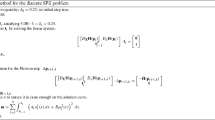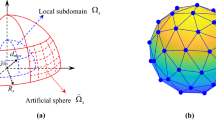Abstract
We discuss adaptive mesh point selection for the solution of scalar initial value problems. We consider a method that is optimal in the sense of the speed of convergence, and we aim at minimizing the local errors. Although the speed of convergence cannot be improved by using the adaptive mesh points compared to the equidistant points, we show that the factor in the error expression can be significantly reduced. We obtain formulas specifying the gain achieved in terms of the number of discretization subintervals, as well as in terms of the prescribed level of the local error. Both nonconstructive and constructive versions of the adaptive mesh selection are shown, and a numerical example is given.
Similar content being viewed by others
References
Choi, S.T., Ding, Y., Hickernell, F.J., Tong, X.: Local adaption for approximation and minimization of univariate functions, to appear in Journal Complexity (2017). doi:10.1016/j.jco.2016.11.005
Jackiewicz, Z.: Implementation of DIMSIMs for stiff differential systems. Appl. Numer. Math. 42(1-3), 251–267 (2002)
Kacewicz, B.: Minimum asymptotic error of algorithms for solving ODE. J. Complex. 4, 373–389 (1988)
Kacewicz, B.: On sequential and parallel solution of initial value problems. J. Complex. 6, 136–148 (1990)
Kacewicz, B., Przybyowicz, P.: Complexity of the derivative-free solution of systems of IVPs with unknown singularity hypersurface. J. Complex. 31, 75–97 (2015)
Lyness, J.N.: When not to use an automatic quadrature routine? SIAM Rev. 25, 63–87 (1983)
Mazzia, F., Nagy, A.: A new mesh selection strategy with stiffness detection for explicit Runge-Kutta methods. Appl. Math. Comp. 255, 125–134 (2015)
Piessens, R., De Doncker-Kapenga, E., Überhuber, C. W.: QUADPACK: a subroutine package for automatic integration. Springer (1983). ISBN: 3-540-12553-1
Plaskota, L.: Automatic integration using asymptotically optimal adaptive Simpson quadrature. Numer. Math. 131, 173–198 (2015)
Plaskota, L., Wasilkowski, G.W.: The power of adaptive algorithms for functions with singularities. J. Fixed Point Theory Appl. 6, 227–248 (2009)
Acknowledgments
I thank L. Plaskota and P. Przybyłowicz for their comments on the manuscript. This research was partly supported by the Polish Ministry of Science and Higher Education.
Author information
Authors and Affiliations
Corresponding author
Rights and permissions
About this article
Cite this article
Kacewicz, B. Adaptive mesh point selection for the efficient solution of scalar IVPs. Numer Algor 77, 57–75 (2018). https://doi.org/10.1007/s11075-017-0304-2
Received:
Accepted:
Published:
Issue Date:
DOI: https://doi.org/10.1007/s11075-017-0304-2




